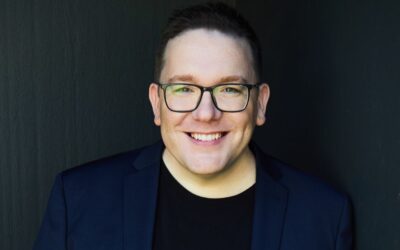An epic work five years in the making, NEVERNEVERNEVERNEVERNEVERNEVERNEVER is the story of a special bond and a special friendship between two seemingly, on the surface, disparate individuals. Aaron Orzech is 36 and Sol Feldman is 13, together their theatrical partnership has created a portrait of the friendship between them both, unfolding through a dialogue between their bodies.
Orzech explains that this work sprang out of another work, The Book Of Exodus, that he and then 8 year old Feldman worked on together. Feldman was performing and Orzech was the dramaturge. “We realised we had a strange resemblance to each other, and started joking that we should make a show where Sol played Aaron, and Aaron played Sol…then we did an initial development just playing around with some physical improvisations, and realised that we could make something really fascinating together,” says Orzech. ” I felt compelled to do it because the images and movements and dynamics we were exploring spoke to something in me around the slipperiness of childhood, the desire to hold on, to return, and the inescapable loss this summons to the surface.”
An exploration between dance and theatre, the project means a lot to both of them, in very different ways, says, Orzech, who acknowledges that they’ve both stayed true to realising the project over a very long period, “..as has the rest of our wonderful creative team, so it will mean a lot to us to finally show it to an audience.” The process has involved brief periods of intensive work, a splitting and returning, with months and years in between.
At the same time, Orzech realises, the show always comes with a certain sadness, because it’s the end of the line…the creation process can’t exist without this end point, but in this piece the process has held as much significance as the show itself.
NEVERNEVERNEVERNEVERNEVERNEVERNEVER is a meditation on boyhood as it is lived, remembered and lost. The construction of childhood innocence, the evanescence of friendship, the inevitable loss entailed in growing up, the impossible desire to hold onto moments that can never last. An interesting statement on an ‘abandoned Neverland’, Orzech says that despite us knowing that nothing stands still, we will never stop turning children into statues, throwing them into the air in the hope they will soar, then weeping and wailing when they actually do.
Audiences should expect to witness two figures (who might actually be one) tumbling through a Neverland that’s been turned inside out, sewn together by ghostly fingers, left behind, torn into pieces and regurgitated as an empty echo of what adults insist childhood must become, even as it flies away and escapes their grip.
Sadly for Orzech and the team there have many delays in getting the work up, even before COVID arrived. Originally Orzech had anticipated making it one year, and creating a very simple, intimate, stripped back work. The intervening years haven’t allowed for a lot more development time, mainly due to lockdowns and all of that; they’ve only really worked on the piece for one or two weeks every year until this final rehearsal period. “But this period has allowed the imaginary world around the work to expand immensely, and has given time for all sorts of new images, associations, subplots, and echoes to find their way into the work,” says Orzech. ” It’s allowed some of the design ideas to really ferment and develop into something quite beyond what I could have imagined when we began. And Sol’s role in choreographing, devising and sculpting the work has become ever stronger over this period. As for surprises, I’m constantly surprised and inspired by his responses to the source material, the space, the sound design and the existing choreography! This has been the case throughout the process, but never ceases to surprise me, and is the real engine that allows to us to keep remaking the work as we go along, which will happen right up until opening night and beyond.”

As expected, the story has evolved quite a lot over the last five years and much has contributed to those evolutions. “Well the world has changed so much in the last five years…five years is also a third of Sol’s entire life! But strangely the process of making the show has been a constant throughout that period,” says Orzech. ” Even during the lockdowns and periods when I’ve lived overseas we’ve kept in touch, and the creative team has stayed the same throughout this period too, so I owe a lot to them for sticking with it; not an easy thing to do when work in the arts is already so precarious. A lot of the material that’s in the show is very close to things we developed years ago, movement sequences that have evolved through that time but come back to some original improvisations and instincts around the piece. Sol is a lot bigger than when we began, so lifting him into my shoulders is more of a challenge these days!” Overall, Orzech thinks that the stories and narratives haven’t changed a lot over this period, but they’ve gone deeper inside them, and found different layers of resonance with their lives and their own bodies as they’ve grown and shifted and stretched to absorb new realities.
Simply, Feldman and Orzech are really good friends, but, says Orzech, their friendship only really exists inside the theatre. “We both like chatting, hanging out and playing handball together, but the guts of our relationship is a kind of silent conversation that takes place when moving and improvising together. This has definitely become more layered and complex over the years, more humorous and lighter too, but dialogue remains largely unspoken.”
Orzech is a Melbourne-based performer and theatre-maker who has worked in both large-scale theatre institutions as well as small, self-funded independent companies. He admits to liking projects that take him outside of himself – ” cross my own frontiers and haul me over the border with them, show me an otherness that I can’t yet understand.” He likes working with new collaborators, but also really enjoys deepening the long-term collaborations he has with other artists. Orzech favours stories that are very intimate, that take us down into the innumerable passages inside ourselves but end up somewhere so far away that we don’t know how we got there.
Inside a moment before childhood is lost forever, a man and a boy capture and dodge each other’s shadows, cleaving together, pulling apart, traversing the ghostly landscape of an abandoned Neverland. They hurl themselves into the sun, sliding in and out of unison, two drowned boys at the bottom of a pond, splitting and returning, refusing to stay still. Says Orzech, “ Come and witness a strange and intimate dialogue between our bodies play out across a beautiful wasteland where the only certainties are disintegration, metamorphosis and loss
November 9 – 13
https://artshouse.sales.ticketsearch.com/sales/salesevent/54338
artshouse.com.au
Images: Pia Johnson



